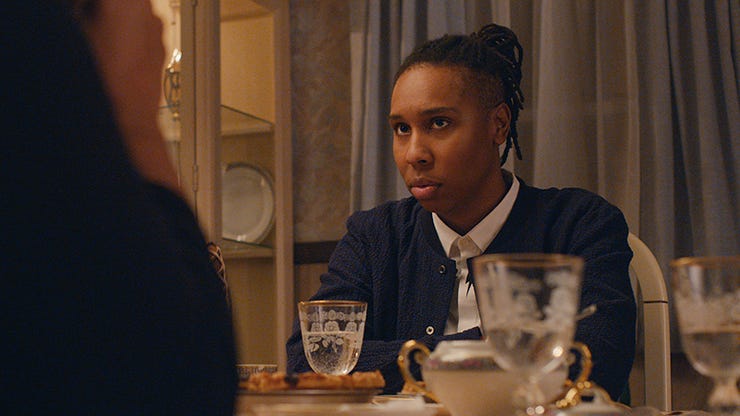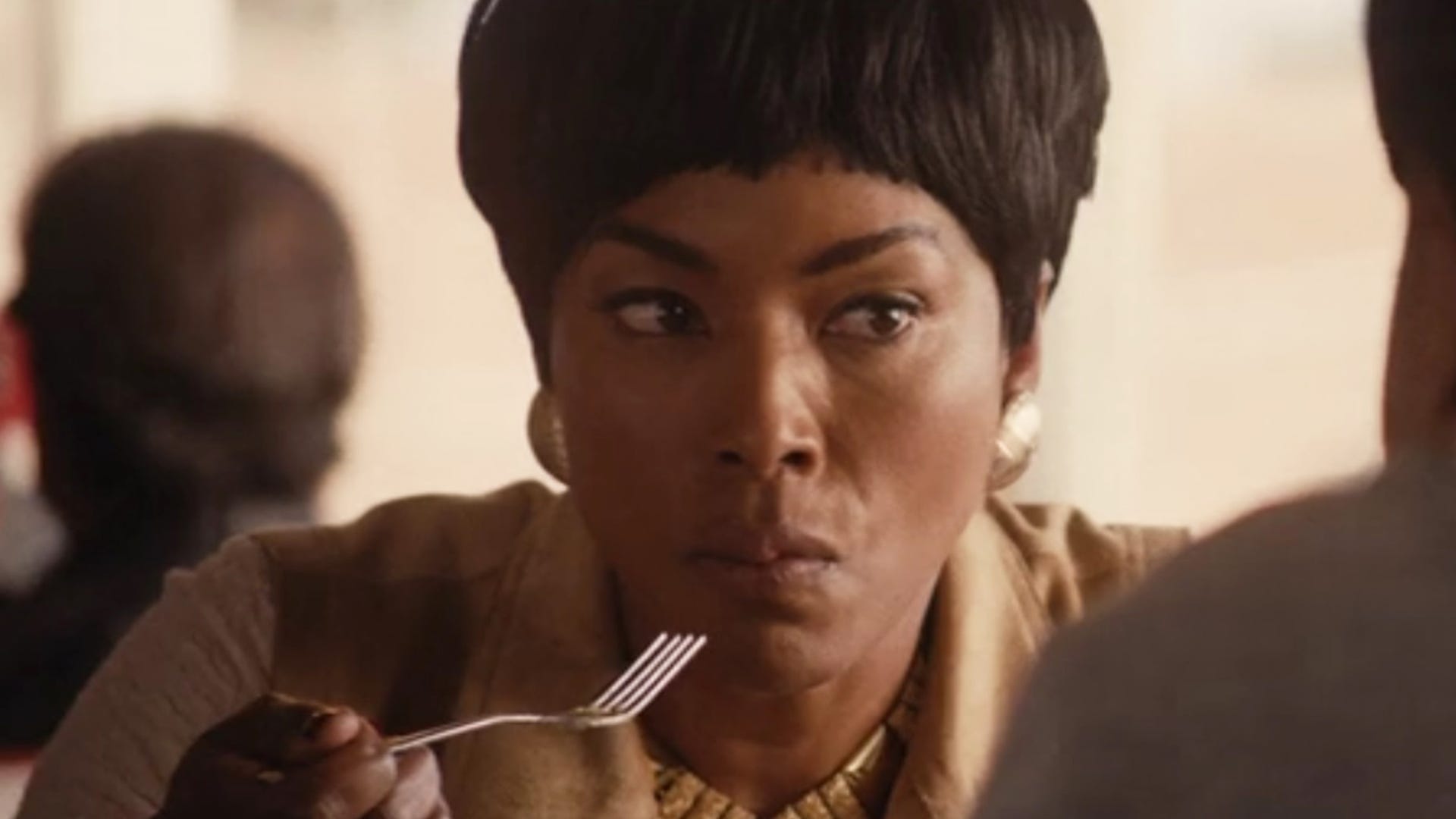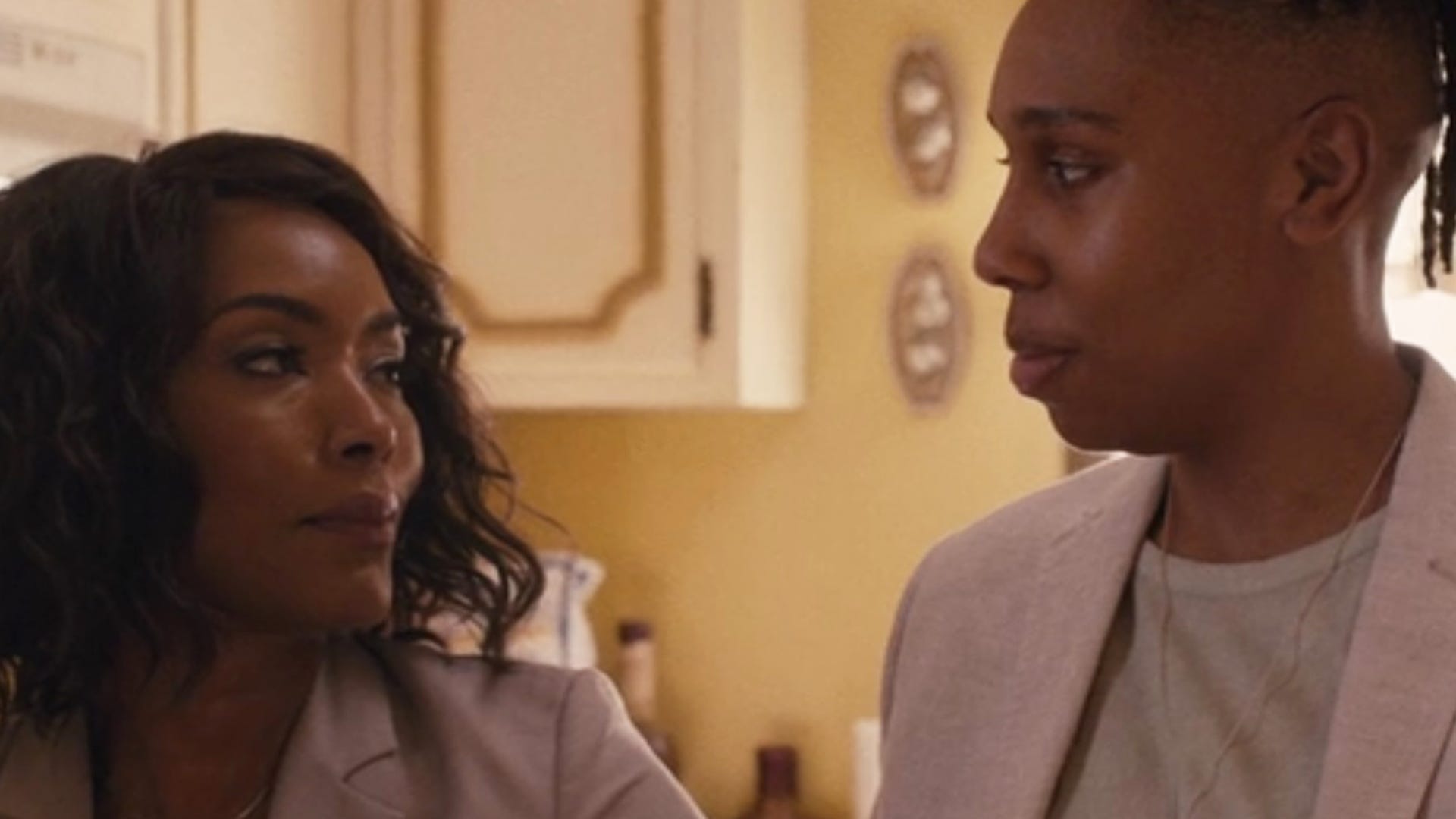Join or Sign In
Sign in to customize your TV listings
By joining TV Guide, you agree to our Terms of Use and acknowledge the data practices in our Privacy Policy.
Master of None's "Thanksgiving" Is TV's Best Coming-Out Episode to Date
Lena Waithe explains how Denise's big episode came to be
[Note: This article contains spoilers about the Master of None Season 2 episode "Thanksgiving."]
Last month, TV viewers celebrated the 20th anniversary of Ellen's infamous coming-out installment, "The Puppy Episode." While the episode is lauded, and rightfully so, for being historic and also hilarious, it's unlikely that many -- or even any -- viewers could relate to a character declaring "I'm gay" into an open microphone in front of hundreds of strangers in an airport.
In the two decades since "The Puppy Episode," there have been a number of other "coming-out" stories told on TV. But there hasn't been one quite as realistic, relatable, touching and complex, as the one depicted in Master of None's Season 2 episode "Thanksgiving."
The episode chronicles Denise's (Lena Waithe) coming-out process -- first to herself, then to her best friend Dev (Aziz Ansari), then to her family -- over the course of nearly three decades, through the narrative device of Dev spending Thanksgiving with Denise's family every year. We first see Denise and Dev in the early '90s, when they're about 6 or 7 years old, and Denise's mom Catherine (Angela Bassett, in an exquisite guest role) describes Dev as Denise's "little boyfriend." Thanksgiving 1996, Denise refuses to wear the dress Catherine has picked out for her to the dinner table; three years later, she comes out to Dev by confessing that she has a crush on a girl at their school, and so on.
Master of None takes rewarding risks in Season 2

Waithe, who co-wrote the episode, says she never intended to tell a coming-out story based on her own life. In fact, the idea for "Thanksgiving" came courtesy of Ansari and co-creator Alan Yang, based on conversations in the writer's room about formative experiences in the cast's lives.
Landing Bassett for the role was a coup -- and an intimidating one. "Angela was definitely that element that made us all sort of raise our game," says Waithe, who already had a list of backup actresses prepared for when Bassett passed. "Already, I'm like, I'm telling this very personal story about my coming out and my family. And now to add on top of it, oh, Angela Bassett's gonna play your mom? ... I always thought it was scary coming out to my mom, but it was even scarier having to come out to Angela Bassett."
The 25 best Netflix originals, ranked

"What I love the most about what actually happened in real life and what we portrayed is that it's an honest reaction. [Catherine] blurts out a couple things that she can't take back, but they're all human reactions," Waithe says. "There is no, 'OK, what's the right thing to say?' Or, 'What should I say in this moment to comfort my kid?' No. it's like, 'OK, this is how I'm reacting to this news you're giving me right now. Even though I've known it, probably, on a certain level. But now you're making it real for me, and that's uncomfortable. I don't know what to do with that. And I'm going to say some things that may not be super nice, but they're going to be really honest.' That's what we wanted to accomplish in that scene."
However, underlying Catherine's reaction is a sense of fear that Denise is now going to have an even tougher time in life than she would have if she were straight. Some would dismiss this as Catherine merely sugarcoating the real issue, homophobia. But Bassett's performance doesn't read that way. Selfishness plays a role in Catherine's response, sure, but that doesn't make her concern about her daughter's well-being any less genuine.
"When parents have a kid that comes out to them... I think the biggest thing is that they have to kind of let go of whatever dream they had for what that child's life would look like," Waithe says. "And I think that's something that a lot of gay kids have to realize. Like, oh, this is difficult for them. They have to mourn this image they had of their kid a little bit. And I learned that you kind of have to give your parent that space and that time to sort of grieve what that fantasy was. There's a lot of learning on both sides."
Nine years after first coming out to her mother, Denise has invited her girlfriend Michelle (Ebony Obsidian) to Thanksgiving dinner for the first time. Denise's grandmother (Venida Evans), wiser than everyone gives her credit for, compliments Denise's "friend" for being the complete package of cute and smart, but with Catherine and Denise's Aunt Joyce (Kym Whitley), conversation is awkward and forced. The evening culminates with Catherine yelling at Denise for being overly affectionate with Michelle at the dinner table. "You be lesbian if you want to, but when you come up in here, you're going to respect my house," she sputters.
But the next year, Catherine finds herself pining for the days of Michelle, when Denise's new girlfriend Nicki (Instagram handle "nipplesandtoes23") makes a terrible -- albeit hilarious -- first impression. When Dev explains that Denise and Michelle broke up because Michelle wanted them to move in together and Denise didn't want to, Catherine realizes that her daughter is perhaps more like her when it comes to relationships than she previously thought.
And that brings us to 2017, when Michelle and Denise are back together and Nicki is, mercifully, out of the picture. Michelle fits right in with the family and even impresses Catherine when she offers to help with the cooking -- something Denise and Dev have never done. The two ladies bond over their disdain for Denise's fashion sense, and before they all sit down to eat dinner, Denise's mother tells her: "I think this is going to be a lovely Thanksgiving, Denise. And I like Michelle. ... I'm happy for you." She reaches to grab her daughter's hand, and in that subtle moment, punctuated by a perfect line reading by Bassett, Denise and Catherine find peace.

Though Waithe didn't consult with her mother or family members when writing the episode (Ansari instructed her: "You've got to tell this story how you remember it"), she says the process gave her a deeper understanding of her mother's perspective.
"It's very difficult being a gay kid coming out to a parent. I can speak to that from personal experience," she says. "But I think what I learned in making the episode is that it's also difficult being a parent, having to have your kid come out to you. In writing the episode, I got a chance to step into my mother's shoes a little bit and try to understand where she was coming from... I realized that was a very difficult thing for her to go through. Not because she doesn't like gay people and not because she's homophobic, but because she got a kid with an added element that she didn't quite bargain for. And it's also an element that no one ever taught her how to deal with."
The brilliant thing about "Thanksgiving" is that it not only allows, but actually forces viewers to empathize with both Denise and Catherine. Sympathy for the characters is not mutually exclusive -- an idea that has rarely, if ever, been explored in previous coming-out stories, but that will undoubtedly ring true for viewers who have gone through a similar experience.
"The mom isn't the villain. And my character isn't the hero," Waithe says. "I feel very honored and proud that I get to tell this story from my point of view. I hope that we're changing the way mothers, daughters, families, view what it means to be gay and black in America now."
Seasons 1 and 2 of Master of None are available to stream on Netflix.
